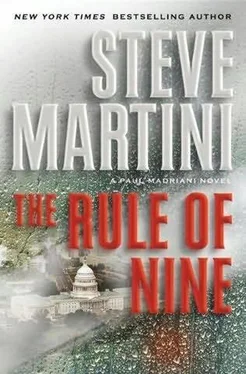In a single stroke Madriani had transformed Liquida’s plans for his own future into cinders.
Among his various paid chores several months earlier, the Mexican had used a chef’s knife from a Del Mar coin dealer’s kitchen to turn him into sliced sushi. As the soon-to-be cadaver lay shivering on the floor, Liquida couldn’t help but notice the glitter of heavy metal all around him, coins everywhere.
While he knew he’d been a good boy, the thought that Santa might come flopping down his chimney with a load of gold anytime soon didn’t seem likely. So Liquida decided to help himself. He hauled off enough precious metal to set up his own gold reserve and form a country, and then played the wizard doing alchemy as he transformed the rare coins into gold ingots that couldn’t be traced.
Until he could wrap it and put on a bow, Liquida stashed his early Christmas present in a safe-deposit box at a bank in San Diego under the name John Waters. With visions of sugarplums, warm sandy beaches, and bikini-clad courtesans dancing in his head, Liquida started browsing pictures of villas in exotic locations in the Wall Street Journal and on the Internet. It was about then that everything came crashing down.
Liquida was starting to get nervous. He hadn’t checked on the gold in a while. Something told him it was time to move it, and it would take a few trips. They had to roll it in and out of the vault on a heavy steel cart because of the weight. Liquida didn’t want to spend time hanging out at the bank while some clerk fished for signature cards and he did an eye tango with the security guard or anybody else who happened by. So he called the bank to tell them he was in a hurry and to ask them if they might have a signature card ready when he arrived. When he gave them the name John Waters and the box number, the clerk did a quick check and told him that, under a court order, the box was sealed.
Liquida wanted to crawl over the phone line to get at her. He asked why, and all they would give him was the lawyer’s name-Paul Madriani. If he wanted to get at the box, John Waters would have to file an objection and go to court. And Madriani knew that whoever owned the box couldn’t do that. If they showed up in court, they’d be met by a firing squad.
Some way, he didn’t know how, Madriani must have traced the name John Waters. Liquida couldn’t figure out how else it could have happened. He had picked the name himself from out of the blue. It was a play on words. “Liquida” meant water in Spanish, but he couldn’t understand how the lawyer would have either name. So how did he find the box? It would probably be the first question he asked when he got Madriani on the working end of a blowtorch.
The next thing he knew, the cops were at the bank with a drill for the lock and Liquida’s dreams of an indolent life on the beach went up in smoke.
The timing couldn’t have been worse. With the economy tanked, now every teenager in Tijuana with a rusty razor was undercutting his prices. You could hire a quick death for the cost of a Big Mac. Throw in fries and they’d make it look like an accident.
Each day he watched as the spot price for gold soared like a rocket while his venom toward the lawyer turned more toxic.
Liquida steered away from the drug cartel at the border and instead began nosing around the fringes of the international terror trade. He had heard enough frantic bargaining from the fevered mind of the Arab before he died to know that there was money there. The only things deeper than the primeval grievances that fueled their hatred were the pockets that paid for the revenge. Even at current prices, there was always more oil money.
Liquida ended up taking a job from an Australian who thought he was fooling the stupid Mexican with his lousy American accent. The word was that the man was wired into a major contract being paid for in euros, most likely money from the Middle East.
He took the job, but he figured there was no harm in stirring a little enjoyment in with his business. Liquida knew he’d left at least three fingerprints on the Dumpster where he’d dropped the burned body. As soon as they figured out who Liquida’s grilled guest was, they would connect the roasted remains to the fireworks in Coronado. The FBI would land on the Dumpster as if it were a national treasure. It would take them a while to sort out all the prints, the guys who drove the hoist trucks and the ones who unloaded them, Dumpster divers who fished through the trash for goodies, and drifters who saw the container as a five-star condo and tried to move in. In the end they would come away with a few prints they couldn’t identify and could not clear. These would end up in the FBI’s big mainframe, a computer somewhere in West Virginia.
Liquida then filched one of Madriani’s business cards from the reception counter in his office. He did this during the chaos of the Paparazzi Putsch when he realized that the two lawyers were nowhere to be found. He superimposed a single patent thumbprint on the back of the business card, using a little graphite so they couldn’t miss it. Then he waited for the right opportunity. It came when Liquida killed the young tour guide in Washington. He had no idea why the Aussie wanted the kid dead. What’s more, he didn’t care. He knew the card with his print would set off all the bells and whistles in the FBI database, roping in the lawyer and leaving the feds to wonder what the connection was between the two cases, and whether Madriani had told them everything he knew.
It was just a little after seven when the flash of headlights roused Liquida from behind the wheel. He saw the car pull into the driveway. He lifted a pair of field glasses and peered toward the front of the house half a block away, on the other side of the street. He watched as a tall, skinny blonde got out of the car and climbed the steps to the front door.
A few seconds later someone opened the door. In the light he could see another woman just inside, talking to the blonde, who was still standing on the porch. They were laughing. A few seconds later they both went inside and the door closed.
As he waited he wrote down the license-plate number from the blonde’s sedan, parked in the driveway.
Several minutes went by. Liquida was looking at his watch as the door to the house opened once more. This time both women came out, the blonde followed by a shorter woman with brown hair who was carrying a light jacket. She was smiling as the two of them came down the steps and headed for the car.
From the corner of his eye, Liquida caught movement up on the porch. He shifted the binoculars, refocused them a little, and there he was. Standing in the doorway waving toward the car in the driveway was the lawyer Madriani.
Liquida had seen his picture splashed all over television enough times that he now had visions of him in his sleep. As he glanced back and forth between the lawyer and the two women, he realized that the brown-haired girl belonged to Madriani, probably his daughter.
Liquida watched as the car with the two girls backed out of the driveway onto the street. Its headlights shone down on him as the car approached. Liquida leaned over on the front seat until they passed, then looked up just in time to see the front door at the house close behind Madriani.
There were many forms of pain; physical was only one of them, and perhaps not the best. Liquida started the car, and pulled away from the curb in a slow U-turn. He focused his gaze on the taillights of the Camry, already a block away as they turned left and headed off toward the bridge.
I grab the wireless house phone from the cradle in the kitchen and punch in the number. It rings three times before he answers.
“Hello!”
“Herman, Paul here.”
“Whassup?”
Читать дальше












